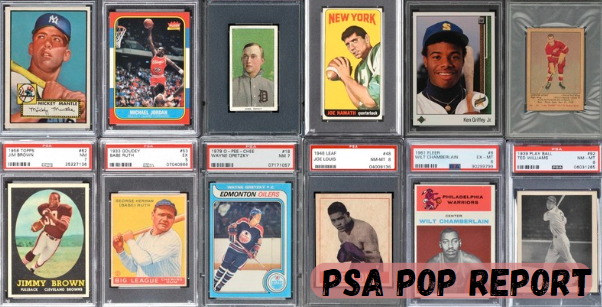The Ultimate Guide to Understanding the PSA Pop Report
Contents [hide]
- 1 Introduction
- 2 What is the PSA Pop Report?
- 3 How to Access and Use the PSA Pop Report
- 4 The Role of PSA Certification
- 5 The Impact of PSA Pop Report on the Market
- 6 Analyzing Trends in the PSA Pop Report
- 7 PSA Pop Report vs. Other Grading Reports
- 8 Tips for Using the PSA Pop Report
- 9 Common Misconceptions About the PSA Pop Report
- 10 Future of the PSA Pop Report
- 11 FAQs
- 12 Conclusion
Introduction
In the world of collectible trading cards and memorabilia, the PSA Pop Report stands as a critical tool for collectors and investors alike. This report, published by Professional Sports Authenticator (PSA), provides invaluable data on the population of graded cards and collectibles.
For anyone serious about trading cards, understanding the nuances of the PSA Pop Report can significantly enhance your ability to make informed decisions.
What is the PSA Pop Report?
Defining the PSA Pop Report
The PSA Pop Report, or Population Report, is a detailed record that lists the number of cards graded by PSA and their respective grades. It offers a comprehensive view of the card’s rarity and condition, serving as a reference point for collectors and investors.
The Importance of the PSA Pop Report
The PSA Pop Report is essential because it:
- Validates Card Authenticity: By verifying the grade and population of a card, collectors can ensure they are purchasing a genuine and accurately graded item.
- Determines Card Rarity: Understanding how many of a particular card exist in each grade can help collectors assess its scarcity.
- Informs Investment Decisions: The data in the PSA Pop Report can influence buying and selling strategies, helping collectors make more informed investment choices.
How to Access and Use the PSA Pop Report
Accessing the PSA Pop Report
To access the PSA Pop Report, visit the PSA website and navigate to the Pop Report section. Here, you can search for specific cards by entering details such as the card’s year, brand, and player.
Interpreting the PSA Pop Report
The PSA Pop Report provides several key pieces of information:
- Card Details: Including the year, brand, and player name.
- Population by Grade: The number of cards graded at each grade level, from PSA 1 to PSA 10.
- Total Population: The total number of cards graded by PSA for that specific card.
The Role of PSA Certification
What is PSA Certification?
PSA Certification involves a thorough authentication and grading process to ensure the card’s legitimacy and condition. Each graded card receives a unique certification number that can be verified through the PSA Certification Verification tool.
Benefits of PSA Certification
- Enhanced Value: Cards with PSA certification typically hold higher market value due to their verified authenticity and grade.
- Market Trust: Collectors and investors trust PSA-graded cards, making them easier to sell and trade.
- Protection: PSA encapsulation protects the card from damage, preserving its condition over time.
The Impact of PSA Pop Report on the Market
Influencing Card Prices
The PSA Pop Report directly impacts card prices. Cards with low population numbers in high grades are often more valuable due to their scarcity. Conversely, cards with high population numbers may see a decrease in value due to their abundance.
Guiding Investment Strategies
Savvy investors use the PSA Pop Report to guide their investment strategies. By identifying cards with low populations and high demand, investors can target acquisitions that are likely to appreciate in value.
Case Study: The 1952 Topps Mickey Mantle
The 1952 Topps Mickey Mantle card is one of the most iconic examples of how the PSA Pop Report influences the market. High-grade versions of this card have low population numbers, driving their prices into the stratosphere. Collectors and investors closely monitor the PSA Pop Report to track the availability and grades of this legendary card.
Analyzing Trends in the PSA Pop Report
Yearly Trends
Each year, new cards are added to the PSA Pop Report, reflecting the growing market for trading cards. By analyzing yearly trends, collectors can gain insights into which cards are becoming more popular and which might be losing interest.
Grading Trends
Over time, the standards and frequency of grading can change. Monitoring these trends can provide insights into the evolving standards of PSA grading and how they impact the value of graded cards.
Market Demand Trends
The PSA Pop Report can also reveal shifts in market demand. For example, a surge in grading activity for a particular set or player might indicate increasing interest and potential future value growth.
PSA Pop Report vs. Other Grading Reports
Comparing PSA to Other Grading Companies
While PSA is a leading authority in card grading, other companies like Beckett Grading Services (BGS) and Sportscard Guaranty (SGC) also provide grading services. Comparing the population reports of these companies can offer a broader perspective on the card market.
Strengths of the PSA Pop Report
- Reputation: PSA’s long-standing reputation in the industry lends credibility to their grades.
- Comprehensive Data: The PSA Pop Report is extensive, covering a wide range of cards and collectibles.
- Market Influence: PSA-graded cards are often seen as the gold standard, influencing market trends and values.
Tips for Using the PSA Pop Report
Strategic Buying
Use the PSA Pop Report to identify undervalued cards with low populations. These cards may present excellent investment opportunities if demand increases.
Selling Decisions
Monitor the PSA Pop Report to determine the optimal time to sell. Cards with increasing populations may see a dip in value, while those with stable or decreasing populations might appreciate.
Collection Management
For personal collections, the PSA Pop Report can help you prioritize which cards to acquire or upgrade, ensuring your collection remains valuable and relevant.
Common Misconceptions About the PSA Pop Report
Misconception 1: Higher Population Means Lower Value
While a higher population generally indicates greater availability, this is not always the case. Demand plays a critical role in determining value. A card with a high population but immense demand can still command high prices.
Misconception 2: PSA Grades are Infallible
PSA grading is highly respected, but it’s essential to remember that grading can be subjective. Minor differences in condition can lead to different grades, and even PSA-graded cards should be examined carefully.
Misconception 3: Only High-Grade Cards Matter
While high-grade cards are often the most valuable, lower-grade cards can also hold significant value, especially for vintage or historically important cards.
Future of the PSA Pop Report
Technological Advancements
As technology advances, the PSA Pop Report is likely to become even more detailed and accessible. Improved data analytics and AI could provide deeper insights into card populations and market trends.
Expanding Card Markets
With the growing interest in trading cards, the PSA Pop Report will continue to expand, covering new sets, players, and types of collectibles. This expansion will provide collectors with even more data to inform their decisions.
Increased Transparency
The future may see greater transparency in the grading process, with more detailed explanations of grading criteria and decisions. This could enhance the trust and reliability of the PSA Pop Report.
FAQs
What is the PSA Pop Report?
The PSA Pop Report is a detailed record of the number of cards graded by PSA and their respective grades, providing a comprehensive view of card rarity and condition.
How do I access the PSA Pop Report?
You can access the PSA Pop Report by visiting the PSA website and navigating to the Pop Report section, where you can search for specific cards.
Why is the PSA Pop Report important?
The PSA Pop Report is important because it validates card authenticity, determines card rarity, and informs investment decisions.
How does the PSA Pop Report impact card prices?
The PSA Pop Report impacts card prices by providing data on card populations. Cards with low populations in high grades are often more valuable due to their scarcity.
What are common misconceptions about the PSA Pop Report?
Common misconceptions include believing that higher populations always mean lower value, that PSA grades are infallible, and that only high-grade cards matter.
What is the future of the PSA Pop Report?
The future of the PSA Pop Report likely includes technological advancements, expanding card markets, and increased transparency in the grading process
Conclusion
The PSA Pop Report is an indispensable tool for anyone involved in the trading card and memorabilia market. By providing detailed information on the population and grading of cards, it helps collectors and investors make informed decisions.
Understanding and utilizing the PSA Pop Report can significantly enhance your collecting and investing experience, ensuring that you stay ahead of market trends and make the most of your collection.






















































Post Comment